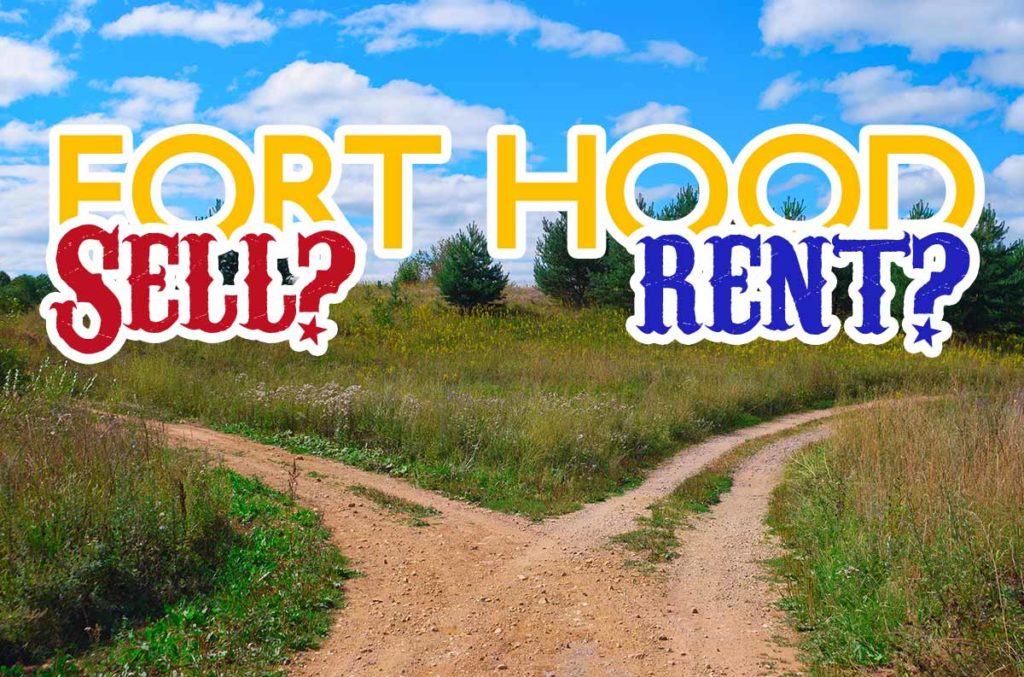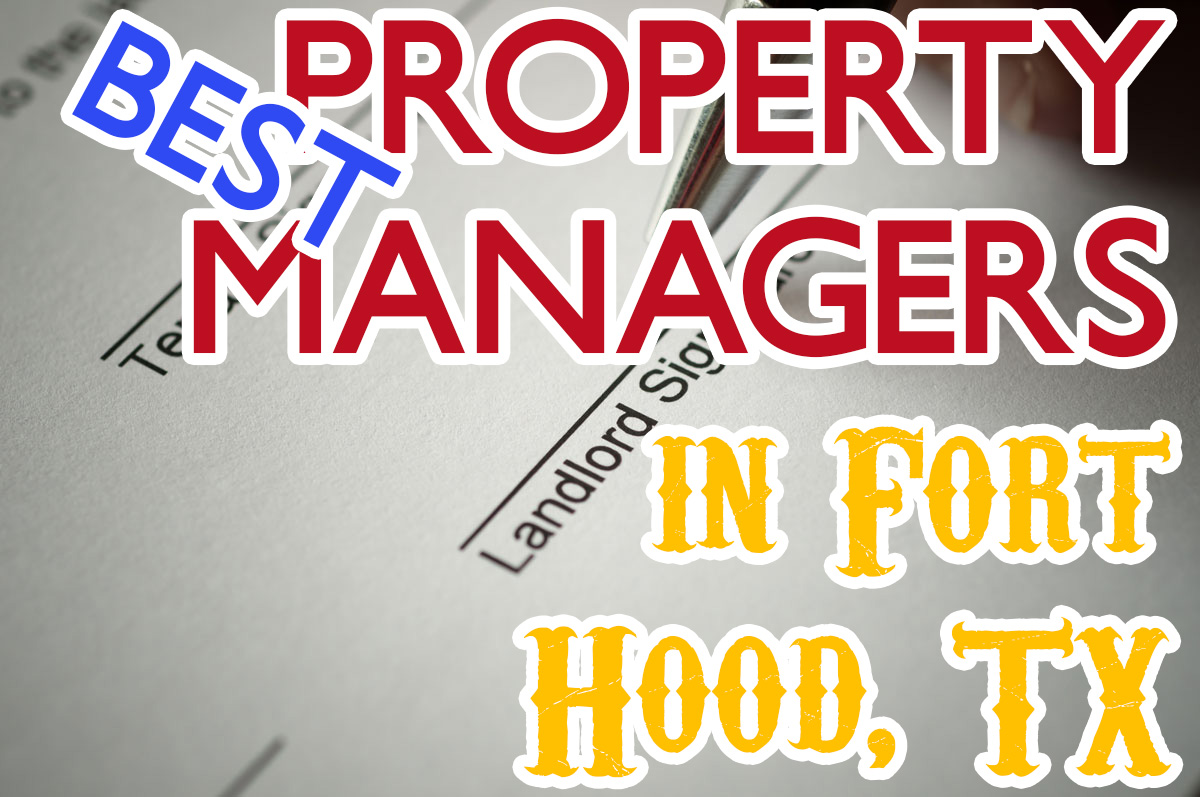
Takeaways
- Talk to a Realtor to get the full picture of both your options
- Sometimes you may need to rent while the market improves or you pay down your mortgage
- You can also try both! List for sale and rent and just go with whichever happens first
A Common Situation for Fort Hood Homeowners
Many homeowners asking this question are in a similar situation.
Often homeowners are military, and perhaps moving because they are being PCSed to a new duty station. Often, you may have only lived in your home a few years. Often, you have paid down very little of your VA loan in that length of time, and perhaps owe more than the home is worth.
Often, Fort Hood homeowners end up renting their home while they continue to pay down the mortgage or wait for the market to rise. Then they sell in a few years.
The First Step
Talk to a Realtor and get a market analysis.
A thorough market analysis should include both sales comps and rental comps. I am a local Realtor in the Fort Hood area, and I am sure to present both the math on selling and the math on renting (and the math on selling directly to an investor, depending on the situation).
Once you are armed with this knowledge, you can begin deciding whether or not selling or renting is the best decision for you.
Advantages of Selling
Cut Ties
You are moving to Germany. Or retiring to Arizona. Or a high tempo businessperson. Maybe the hassle of owning a property in Central Texas just sounds like a headache. Even with a good property manager, you still have to pay attention to what is going on, your mortgage, and incoming rent. Sometimes it is easiest just to move on.
Avoid Negative Cash Flow
The landlord math is tough. If your mortgage is $1000/mo and the home rents for $1200/mo, you are probably actually losing money each month as a rental. That might be okay as you are also gaining equity and tax benefits in a rental, but negative cash flow can be hard on the family finances in the meantime. You can’t buy groceries with home equity.
Reinvest
If your home is a rental for too long after you’ve lived there, you might end up having to pay taxes when you ultimately sell. Instead, for an owner-occupied sale, any profit on the sale is tax-free.
If you’ve owned the property a while as a rental and are still looking to avoid taxes, you can do so with a 1031 Exchange. That is definitely worth exploring if you are looking at pulling out money to reinvest in bigger and better investments.
No Tenant Damaging Your Property
If you are moving out of your home, chances are you took better care of it than your future tenants will. It may be in the best shape it is going to be going on the market.
Best Fort Hood Property Managers
- Start your property manager hunt early to get the most of their advice
- Interview multiple property managers
- Don’t manage it yourself. That is active income, not passive income.
Avantages of Renting
Opportunities for Appreciation and Diversification
The Fort Hood market has generally kept up with inflation if not surpassed it, so homeownership is a way to keep your money invested in an inflation-resistant asset.
But generally, homes do not appreciate beyond the inflation rate. It’s better than sticking your money under a mattress! And an opportunity to diversify away from stocks, bonds, or other savings.
Positive Cash Flow
If the numbers work out, and you are breaking even or even earning money after accounting for all the typical expenses of a landlord, then why not hold onto the home? Go for it! You can earn a little money each month plus all the other benefits of equity, appreciation, and tax benefits.
Tax Benefits
When you turn your home into a rental, you can begin depreciating the home, which usually adds up to several $1000 in tax deductions annually. You can deduct many other items related to landlording, which can add up to a lot!
Cheaper
Often you need to do less to get a rental property in shape versus a home for sale. Buyers are more likely to expect new carpets, upgrades, and recently replaced roofs (after the 2014 hailstorms in our area).
Quicker
Selling can take a few months. Renting can happen as quickly as a week.
Plus, selling with a tenant is almost impossible, so when selling, it is best to have the home vacant. That means no rent checks, but still paying a mortgage. Sometimes that is not an option for some homeowners.
Fewer Repairs Needed
A renter doesn’t complete an inspection before they move in. They don’t care if the roof has hail damage as long as it isn’t leaking.
A buyer cares about all these things. Buyers in the Fort Hood market usually get a fair number of repair concessions so a home needing some repairs might make a better rental until you’ve saved enough to make the necessary repairs to sell.
Why Not Both?
If you are willing to sell, but also not sure about sitting on the market waiting for a buyer, then maybe it is worthwhile to try listing the home both for rent and for sale.
I’ve done this with several local homeowners. In one case, I listed their home for sale and rent. It rented first after about two weeks. About a year and a half later, the tenant moved on and I again listed it for sale and rent.
The second time, it sold, and worked out great for them.
My Personal Experience
I bought five homes in five years while active duty military, three of which are in the Fort Hood area. I still as of this writing have all five (one is a fourplex).
I could have bought my homes smarter – focusing on multi-families or foreclosures. I know that now that I am a Realtor (and work frequently with local investors). All three of my single family rentals have negative cash flow, anywhere between $100-$300/mo.
That would be okay because I am earning a tremendous amount of equity and tax benefits that outpace my monthly expenses if I hold onto all three for the lifetime of the 30-year loan. But with three negative-cash-flow rentals, that is a drain on our family’s budget! Plus, the lifetime ROI is probably not going to be spectacular, at a modest 5% or so.
I will probably start selling some of my single family rentals as the tenants start moving out. Instead of a negative cash flow, I can reinvest that $100-$300/mo into something else.
Had I bought foreclosures or multi-families and has positive cash flow, or even close to breaking even, I would choose to hold onto all my single-family rentals.
Many investors say that investing is all about cash flow! After my experience, I would agree.
My Recommendation
If you can cash flow, keep it.
If you can’t cash flow, and the negative cash flow is $100+, consider selling when you have the opportunity to do so.
Conclusion
Ultimately, there is no universal right answer. It depends on your own circumstances.
I am a local agent in the Fort Hood area. If you have questions and are making this decision now, please contact me! I can help walk through your specific situation based on the current market, your property, and your needs. I can help you sell, or recommend a property manager and course of action to get it rented!

